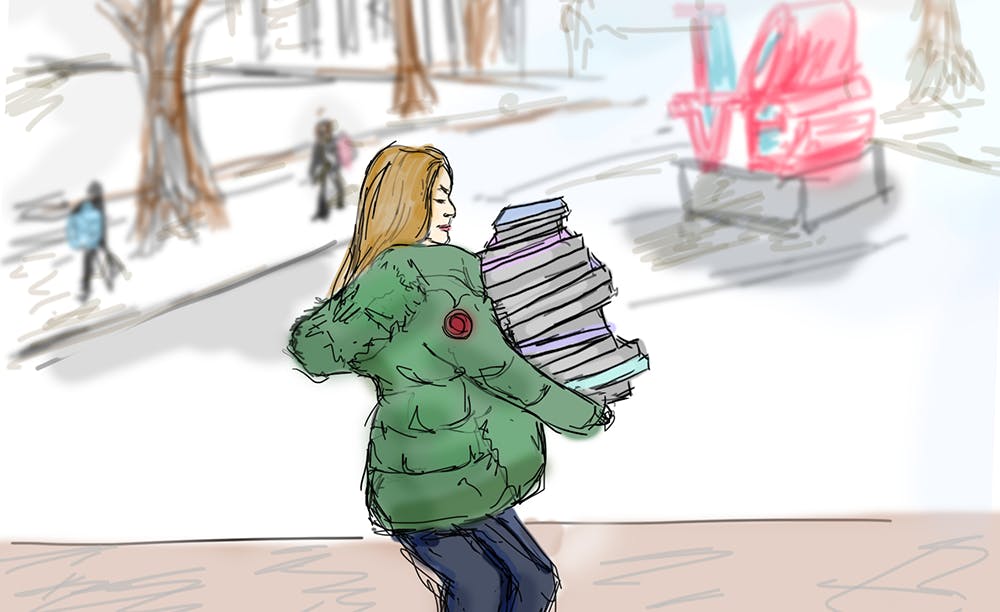
I imagine I’m not the only one for whom the video of accepted early decision Penn applicants, captured in their teary-eyed moments of jubilation, brought back fond memories of my own Penn acceptance. But I also viewed the video with a bit of dejection, wondering how many of these same students would, like so many before them, become harsh critics of the same institution they shed tears of joy to join. Hypercompetitiveness, overburdened mental health resources, too much drinking carried out by students, not enough drinking permitted by the administration … one must look no further than The Daily Pennsylvanian Opinion section to get a bearing on what students find wrong with Penn.
Especially in light of our own gleeful college acceptances, it is crucial that, as my friend and fellow columnist Lucy Hu beautifully articulated, we remember to love Penn. But being mired in pessimism is a distinctly human problem, not just a Penn problem.
In his seminal graduation speech, “This is Water,” the late author David Foster Wallace gives a particularly memorable account of the banality of the average day as an adult. Being aggravated by nuisances like slow checkout lines or traffic jams, Wallace says, is the default mode for most of us as inherently self-centered, short-sighted human beings.
One of my favorite films (though conventional masculinity means I’d never admit that in public), "About Time," which loosely belongs to the realm of romantic comedies, picks up on Wallace’s theme. The main character, Tim, inherits the ability to travel through time. By living each day twice, Tim is able to enjoy each moment with foresight of the worries and tensions that keep him from relishing how sweet the world can be.
Sounds lovely, but not all of us can time travel; only the M&T kids seem to have been given Time Turners. Luckily, Tim himself offers a feel-good solution: Live each day as if it were the second time.
The problem with advice like this is that it’s quickly left behind and absent from our psyche when we need it most. Sure, when you’re sprinting to your 9 a.m. when the temperature’s below freezing, it’s best to be totally stoic in the process, keeping firmly in mind nothing but your gratitude for your thousand blessings, among which is the mere opportunity to take a 9 a.m. class at the University of Pennsylvania. Unfortunately, these positive thoughts will likely slip away as soon as you trip on an un-salted sheet of ice.
Being aware of what our University lacks, and calling for our community to do better, is often a worthy exercise of the critical thinking skills our liberal arts education is supposed to endow us with. All too often, however, we fall into a trap of pessimistic passivity — far easier to blame the curve (as I’ve done) or administrators (yup) or “the toxic pre-professional culture” (guilty) than ourselves.
Only recently have I recognized that when I direct blame at external factors, I implicitly relinquish a bit of individual agency in the process — and this is terrifying.
Our experiences of reality are tinged by the lens which our memories and beliefs dispose us to adopt. And here lies a curse for some and a blessing for others. Our varied perceptions of the same reality explain why you can love that course that your buddy hates, and find that same test unfair that your classmate thinks was a breeze.
My grandfather is particularly fond of these words from the great Persian poet Rumi: “Yesterday I was clever and wanted to change the world. Today I am wise, so I am changing myself.” My prescription, for myself and for everyone else, is to angle for Rumi’s form of wisdom.
Changing the world for the better, or changing Penn for the better, may be more of a 10-year plan. The type of thing we might queue up for future New Year's Resolutions. But if we can work first on changing ourselves for the better, cultivating a perspective and attitude that fortifies us against the curves of classes and the curveballs of life, we can radically alter the world as experienced from our personal vantage point.
As for Penn, it’s a safe bet that none of us students knew exactly what we were signing up for. Still, as with any new path, we signed up for possibility.
There is no one Penn experience, and even if we may hold certain gripes in common, it is ultimately the individual responsibility of each of us to forge for ourselves a path we are proud to look back on. Finding out how is the fun part.

MATEEN TABATABAEI is a College freshman from Newton, Mass. His email address is mateen@sas.upenn.edu.
The Daily Pennsylvanian is an independent, student-run newspaper. Please consider making a donation to support the coverage that shapes the University. Your generosity ensures a future of strong journalism at Penn.
Donate







